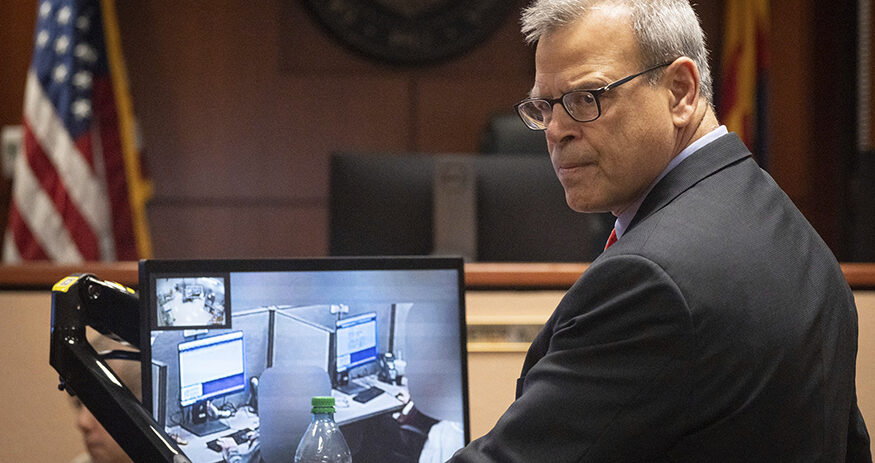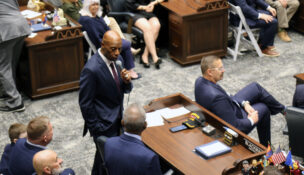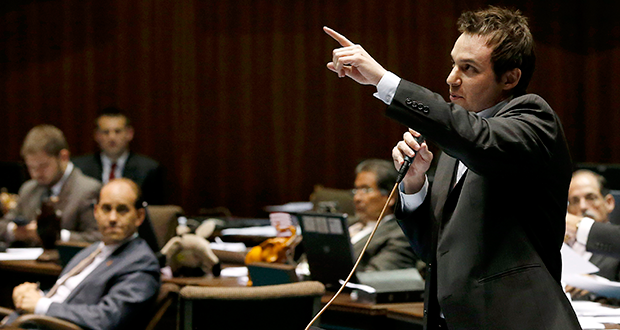Lake, Finchem attorneys beat State Bar in discipline case
Kiera Riley Arizona Capitol Times//August 27, 2024//
Lake, Finchem attorneys beat State Bar in discipline case
Kiera Riley Arizona Capitol Times//August 27, 2024//
Two attorneys who represented former gubernatorial candidate Kari Lake and former-Secretary of State candidate Mark Finchem in their bid to see electronic voting systems outlawed ahead of the 2022 election dodged disciplinary action following a ruling by the state disciplinary panel.
Kurt Olsen and Andrew Parker faced claims of five ethical violations for alleged missteps in a lawsuit with the stated goal of outlawing electronic voting and tabulation machines in the 2022 election.
A state disciplinary panel, consisting of presiding disciplinary judge Margaret Downie, attorney member Ralph Wexler and public member Randall Clark, dismissed the entirety of the complaint against Parker and Olsen and cited recent state case law warding against sanctioning attorneys for bringing “long-shot” cases, with an eye toward election cases.
“There is no reason to believe our Supreme Court would apply a different or lesser standard in the context of attorney disciplinary proceedings,” the panel wrote.
Ahead of the 2022 election, Lake and Finchem filed suit against then-Secretary of State Katie Hobbs and the Maricopa and Pima County Boards of Supervisors and sought to see voting machines and tabulation machines declared unconstitutional given alleged security vulnerabilities.
The suit was ultimately dismissed by the district court and found Lake and Finchem lacked standing “because they have articulated only conjectural allegations of potential injuries” and could not obtain their state relief under the Purcell doctrine, which bars last minute changes to election rules. The judge granted $122,200 in sanctions against Parker and Olsen, and held associated counsel Alan Dershowitz responsible for $12,200.
The Ninth Circuit affirmed the suit’s dismissal, though declined to order additional sanctions, and the Supreme Court declined to take up the issue on appeal.
In December, the Attorney Discipline Probable Cause committee entered orders against Olsen and Parker, paving the way for the State Bar to file a formal complaint with the Presiding Disciplinary Judge. And after a discovery phase, attorneys for the State Bar and Parker and Olsen, representing himself, convened in a three day hearing in June.
The State Bar claimed Parker and Olsen violated rules requiring competence, diligence, meritorious claims, and barring conduct involving dishonesty, fraud, deceit, or misrepresentation and conduct prejudicial to the administration of justice for missteps in the case, though clarified none of the alleged violations hinged on the central claim in the suit.
The Bar rather alleged ethical misconduct by Parker and Olsen in the initial complaint and in a motion for preliminary injunction.
In the initial complaint, the Bar claimed the two had relied on dissimilar caselaw, improperly cited findings related to voting machine connectivity to the internet, advanced an ill-fated standing claim and selectively included information on testing of electronic voting systems.
And in the motion for preliminary injunction, the Bar claimed Parker and Olsen filed the motion for preliminary injunction too close to the 2022 election, lacked a good faith basis to claim the requested relief, a ban on all electronic voting systems, would “cause little if any harms to the defendants,” and failed to cite a case in addressing the standard for mandatory injunctive relief.
But in an order Monday, Downie, joined by Wexler and Clark, dismissed the State Bar’s complaint filed against Parker and Olsen in its entirety.
The panel found Parker and Olsen demonstrated competence and “collectively possessed the legal knowledge, skill, thoroughness, and preparation reasonably necessary” to take on the case.
As for the case itself, the panel noted the case and sought-after relief was a “long shot,” but cited the Arizona Supreme Court’s recent ruling in Arizona Republican Party v Richer, which protects attorneys from sanction even in cases that are “long shots.”
In concluding, they found “Retrospective scrutiny of any complex litigation may reveal some measure of imprecision, legal arguments fairly characterized as long shots, puffery in advocacy, and reliance on authorities that are distinguishable in some respects. Such is the case here.”
The State Bar did not immediately respond to a request for comment.
“This entirely vindicates the work that we did,” Parker said. “This complaint should not have been brought.”
Parker and Olsen are still in the process of appealing the $122,200 sanction awarded by the district court and are due in front of the Ninth Circuit Court of Appeals Sept. 11 for argument.














































